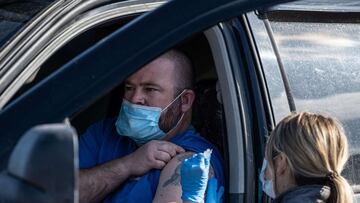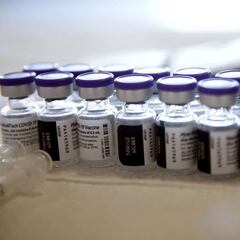What to do if you get covid-19 between vaccine doses?
The CDC doesn’t consider you fully vaccinated until two weeks after you have finished the full regiment of the covid-19 vaccination received.

The vaccination rollout across the US continues to gain momentum with the rolling 7-day average now surpassing 3 million individual shots per day. But even those that are vaccinated should still exercise caution according to the CDC.
The three vaccines that have been approved by the Federal Drug Administration for use in the US have proven highly effective in trials. Until a person has been fully vaccinated, they won’t enjoy the full protection the vaccine can afford them.
- When are you fully vaccinated from Covid: which vaccines require two doses?
- Which US states are vaccinating the fastest?
- How long does the Moderna vaccine last?
- Where and when you can get your vaccine in the US
Is it possible to get covid-19 after vaccination?
The US is currently using the Johnson & Johnson one-dose covid-19 vaccine and the two-dose Pfizer and Moderna covid-19 vaccines. From a study of the vaccination campaign in Israel, looking at the efficacy of the Pfizer and Moderna vaccines, the data closely followed that obtain during the trials of the two vaccines.
It showed a 52% protection rate for those who had received the first dose of the vaccine, which included infections that occurred within 10 days of the first shot being administered. In that first 10-day window the body hasn’t had enough time to generate the anti-spike antibodies that provide protection from the virus.
A week after the second dose, which is before that dose would have a chance to work, the protection rate from the first dose was around 91%. The two doses of Pfizer are given 21 days apart while the first and second dose of the Moderna are separated by 28 days.
Our progress on vaccinations is proof that there’s nothing America can’t achieve when we do it together. pic.twitter.com/51fKUzciVJ
— President Biden (@POTUS) April 11, 2021
What should I do if I get infected between shots?
If you should contract the covid-19 vaccine after the first dose, you should quarantine at home. Should you experience adverse symptoms, call your doctor. Depending on the severity of the symptoms you should isolate for 10 to 20 days after the first symptoms appear and at least 24 hours since your last fever without the use of fever reducing medications. Your symptoms, such as cough, shortness of breath, should also have improved.
If you are or will be within this quarantining period when you are due for your second dose, make arrangements to change your appointment. The CDC considers 42 days, or 6 weeks, as the allowable interval between the first and second dose should it not be feasible to adhere to the recommended interval. But try to reschedule as soon as possible.
If there’s enough time for you to fully recover before your next dose, then there shouldn’t be a problem going.
Man tests new Moderna COVID-19 vaccine booster designed to protect against varianthttps://t.co/fykiDHX1Ph
— TODAY (@TODAYshow) April 12, 2021
Can I get covid-19 after I’m fully vaccinated?
Related stories
An exceeding small number of Americans have contracted covid-19 even after getting being vaccinated. These “breakthrough” cases represent just a fraction of a percentage of the nearly 120 million people that have been vaccinated with at least one dose so far.
The CDC recommends that even those who are fully vaccinated should still take precautions to avoid infection, such as social distancing, wearing a face mask and avoiding crowds and poorly ventilated spaces. Currently the infection rate is climbing once again in the US with new more virulent strains. At the beginning of the month the UK, or Kent, variant became the predominant strain in the US.


